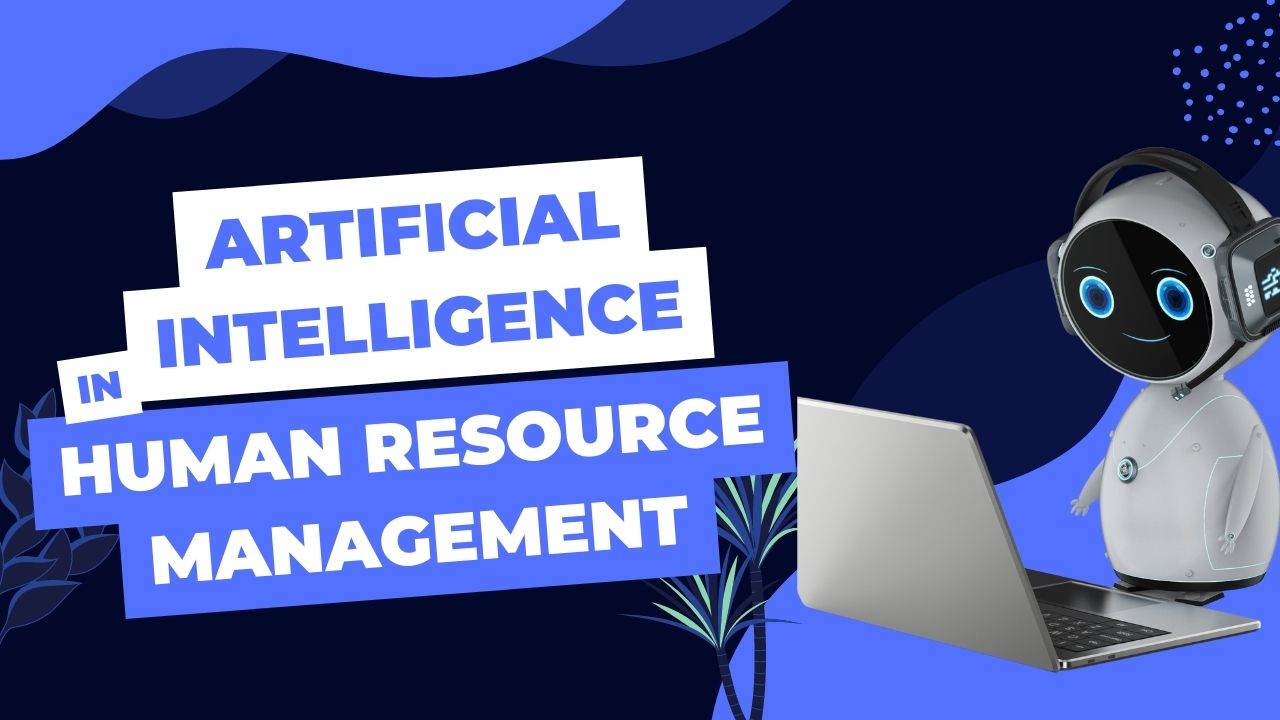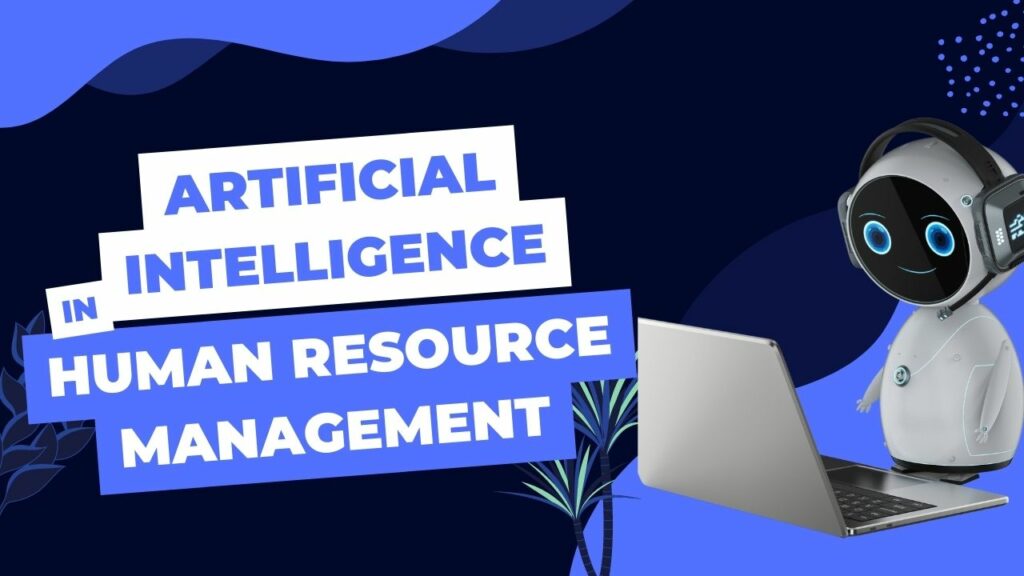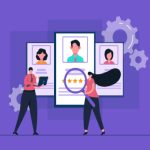 The need for human resources professionals to comprehend how AI in Human Resource Management works in transforming the workplace is outright essential. Key advantages of HR technology comprised cost savings increased productivity, and aiding in the learning and development of personnel. Thanks to AI technology, HR divisions can tackle some of the most significant business difficulties, boost operational capability, and even benefit the entire company’s success.
The need for human resources professionals to comprehend how AI in Human Resource Management works in transforming the workplace is outright essential. Key advantages of HR technology comprised cost savings increased productivity, and aiding in the learning and development of personnel. Thanks to AI technology, HR divisions can tackle some of the most significant business difficulties, boost operational capability, and even benefit the entire company’s success.
AI has applications in almost every sector and profession, and human resources management roles are no exception. Although artificial intelligence comes as a creation of science fiction, today’s professionals know how innovative technology is constantly transforming workplaces.
Also read: The Rise of Intelligent Automation: The Future of Work with AI
What is Artificial Intelligence?
Artificial intelligence is a popular topic these days, but what exactly is it? In the simplest terms, Artificial intelligence uses robots and computers to simulate how the human mind makes decisions and solves problems.
In a 2004 publication, John McCarthy defined artificial intelligence as the art and science of creating intelligent devices and brilliant computer programs. Although it connects to utilizing computers to comprehend human intellect, AI should not be limited to techniques that are by biological means.
In its most basic form, Artificial Intelligence combines computer science and substantial datasets to facilitate problem-solving. Moreover, it includes the branches of artificial intelligence known as deep learning and machine learning, commonly addressed together. These fields employ AI algorithms to build expert systems that predict or categorize information based on incoming data.
How is AI amalgamated with HR?

HR has to ensure that every person is secure, has access to the help they need, and has the freedom, knowledge, and empathy necessary to produce above-average work.
Artificial intelligence, one of the most cutting-edge and quickly developing technologies, has dramatically enhanced the HR department. Most low-value HR tasks are automated and completed by AI, freeing up time for more strategic work.
Artificial intelligence uses coherent computing techniques and preprogrammed algorithms to make judgments in real-time. Artificial intelligence will have an impact on human resources.
A customized employee experience delivers by properly integrating AI throughout the entire employee lifecycle, from hiring and onboarding to providing HR services and career planning.
HR Reporting Confidence in AI Integration
AI may first and principally bring instant value to the HR and recruitment processes by anticipating talent management needs inside a company or a particular department. Insight-driven predictions made possible by AI are there to effectively gather and analyze information about job openings and demands for new teams from various departments. This can significantly assist HR teams in prioritizing their hiring requirements.
AI-based HR interventions can significantly increase employee output while assisting HR practitioners in improving employee performance and satisfaction. AI-powered HR solutions can assess, forecast, and support decision-making for essential stakeholders. Adopt AI solutions that are appropriate for your business, match your organization’s culture, and help you create the necessary digital maps. Workers will eventually be affected by the AI function in various ways and have a quick and precise user experience. Consequently, it is imperative to concentrate on employee needs and be aware of the possible results you anticipate.
The good side: AI as the future of HR
The amount of data HR departments must process daily is one of their significant problems. Thousands of documents are produced just during the employment process alone, and they must be saved, monitored, and made readily available. Artificial intelligence can be helpful in this situation. AI can assist HR workers in efficiently analyzing enormous volumes of data, deriving meaning, and providing insights. AI is already widely used by HR software providers to help automate procedures like employee onboarding and the acceptance of time off requests.
1. Streamlining hiring and removing biases in recruitment can be achieved through the use of AI
The talent acquisition process may be where artificial intelligence in HR is essentially remarkable. AI decreases the time and effort needed to execute these tedious tasks, from screening applications to managing databases, setting up interviews, and responding to and resolving candidate queries. As a result, the HR team can concentrate on more important jobs like procurement, personnel planning, recruitment marketing, and other beneficial operations. It also dramatically shortens the hiring process and saves time. The selection of a prospect who largely satisfies the company’s standards will be made more accessible with the help of AI-assisted recruitment. As a result, the screening process is easy, efficient, and fair.
2. Simplifying HR functions
AI technology is available around the clock and can remove human mistakes from routine procedures. It can improve the HR experience for managers and staff. Managers and HR may focus on more crucial activities by reducing time spent away from the office coordinating schedules. Also, personnel will be on time as they try to make preparations.
Deploying AI in recruitment can enhance a company’s diversification, fairness, inclusivity, and belonging initiatives, reduce the risk of unconscious bias in hiring decisions, and enhance the candidate experience. Building a more diverse workforce analytics and corporate culture can also help firms better compete for talent and integrate human-centric hiring methods.
3. Improving onboarding processes
To reduce the time and cost of hr processes, it is essential to have a new employee onboarding procedure.
Artificial intelligence technology is to speed up this process and further minimize workload. The onboarding process significantly impacts a new hire’s performance management and job satisfaction, which affects retention rates.
4. Developing a more useful training strategy
By incorporating AI into your training programs, you can customize the learning environment for each individual. You can use it to evaluate the expertise of your staff members and suggest particular training courses to get them ready to succeed in your courses.
To identify which person needs more training, you can also utilize it to sort through company training stats. Alternatively, based on training history and needs, to assist in identifying potential job options. Your staff will be able to learn more quickly and concentrate on the skills required to stay current in their industry with the help of the appropriate AI tools.
Also check: Window Manager Software for Windows PC
6 Top Applications of AI in HR

As Human Resource professionals try to maximize the blend of manual and automated work, HR is moving toward a mix of digital and human future.
1. Recruitment and Onboarding
Hiring experienced, talented people will likely result in the organization’s future growth, making hiring one of the HR department’s most important jobs. AI reduces the time and effort required to execute these laborious processes, including screening, updating candidate databases, setting up interviews, and answering and deciding on contestant queries. Likewise, if the onboarding process is efficient and informative, employees are likelier to stay at the company for a long time.
2. Orientation of Newer Recruits
AI can make online orientation training programs, virtual onboarding solutions, and data-driven recruitment platforms more efficient. Companies can use AI for employee onboarding to ensure that new workers are immediately ready for success.
3. Training the Recruits
The efficacy of courses, areas for improvement, and significant trends and patterns are discoverable using AI techniques. You may improve your training strategy, content, and courses with the information to get better results. Continuous data collection can be handled by AI, allowing for always-informed business decisions.
4. Internal Mobility and Employee Retention
Employers may understand better and organize employee engagement and retention tactics with the help of AI. Employees who have a deeper understanding of their working lives feel more valued and capable of advancement within an organization.
5. Automation of Administrative Tasks
An AI-based system can manage all the repetitious administrative chores with minor user intervention. AI-driven insights can assist businesses in streamlining procedures and enhancing customer experiences.
6. Enhancement of employee experience:
By removing monotonous jobs, AI may collaborate with humans to improve their work, making them more efficient and quick at every activity. This can increase employee happiness. In addition, AI gives your agents vital chances to grow their careers.
The bad side: Limitations of AI
AI’s inability to think creatively beyond the box is a significant drawback. With pre-fed data and prior experiences, AI can learn over time, but it cannot take a novel method. When asked to perform activities that were not designed or intended, machines typically fail or produce meaningless results, which can have substantial negative repercussions. As a result, they are only able to provide something traditional.
The ugly side: The cons of AI in HR
AI can spot patterns, but patterns are only some of it. AI has the power to identify patterns in enormous amounts of data quickly. Nevertheless, it cannot correctly assess eagerness, openness to learning, genuinely emotional and social intelligence, and other essential qualities in a productive, collaborative working atmosphere.
Although AI offers numerous benefits, it also has drawbacks, outlined below.
1. Introducing machine-generated errors
When conducting analysis, a computer is not the most dependable tool. Therefore you can only rely partially on it. A wide range of circumstances can cause computer failure. The misunderstanding of data may occur when there are programming mistakes. When choosing potential individuals, you could inadvertently take the wrong criteria into account.
So, relying entirely on AI is not good, especially regarding meaningful reports.
2. Perpetuating biases in hiring
Implicit bias will be evident in the results you obtain if the program’s initial parameters incorporate it. While selecting candidates, AI may accidentally introduce prejudices and disqualify qualified, diverse individuals.
3. Some decisions require human involvement
AI is excellent at analyzing data and providing insightful recommendations for decision-making, but it sometimes needs to include significant non-technical aspects.
While assessing job seekers, it cannot consider factors like business culture. Also, it needs to discern whether a candidate possesses deep, fundamental qualities like enthusiasm and tenacity. If you entirely delegate decision-making to AI, you can wind up with a collection of technically competent applicants who will fail in your workplace.
4. Increased risks to cybersecurity
Hackers can easily access many AI tools. For instance, chatbots can be excellent tools for expediting standard HR procedures, but they are not impervious to cyberattacks. Via these apps, you risk disclosing private information that could expose you to identity theft or cyberattacks.
FAQs
How does AI impact human resource management?
Artificial intelligence has improved practically everything, including the human resources industry, in the labor-intensive environment.
From employee learning and development to enhancing leadership abilities, it has offered many benefits to HR. AI-integrated tools help with employee relationship management and retention as well.
Why is AI important in HRM?
Artificial intelligence, with its capacity for analysis, diagnosis, and prediction, is becoming increasingly common in HR operations. HR departments may now analyze data to draw conclusions and provide real-time advice thanks to AI. In sensitive and important jobs like human capital management, AI eliminates many typical human biases and inconsistencies.
To what extent can we automate human resource specialist or human resource manager?
It is tasks that are automated, not employment positions. It is possible to automate practically all administrative and regular HR operations. Several HR-related tasks, including coaching, training, and meditation, still need to be automated, even though many HR professions have.
Will AI replace HR managers and officers?
While AI does eliminate some tasks, it also frees us to focus our energies in new directions. AI can integrate smoothly into HR activities. HR professionals are not replaceable by HR tech in the future, but they will always be around. Moreover, it will take over or supplement human resources management’s role in tasks like finding, recruiting, developing, and keeping people. HR Robots cannot replace HR professionals.
You may also like: How Artificial Intelligence Applications Are Revolutionizing Healthcare
Conclusion
AI in human resources management can increase output, lower operating expenses, and reduce time spent on tedious, repetitive tasks. It continuously gathers and analyzes essential data to aid HR professionals in doing their jobs more effectively. They should integrate it into their online HR training program. By boosting the employee experience, it can also increase the rate of staff retention. AI undoubtedly represents a development that is very advantageous to a workplace, even while its limitations prevent it from completely replacing the entire HR sector.





